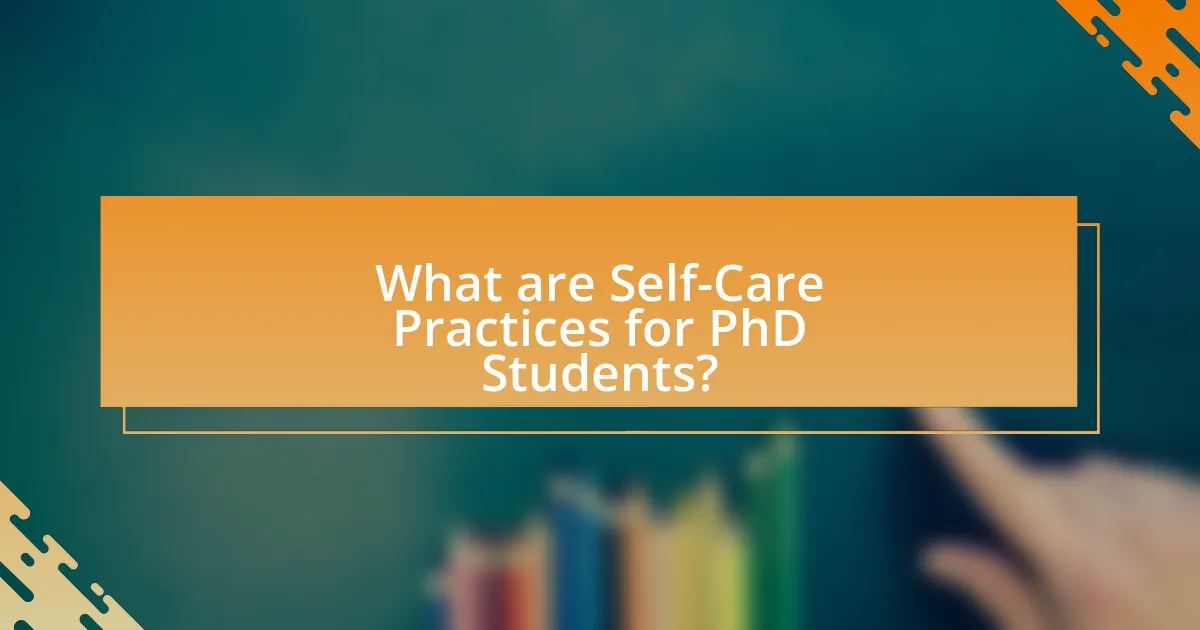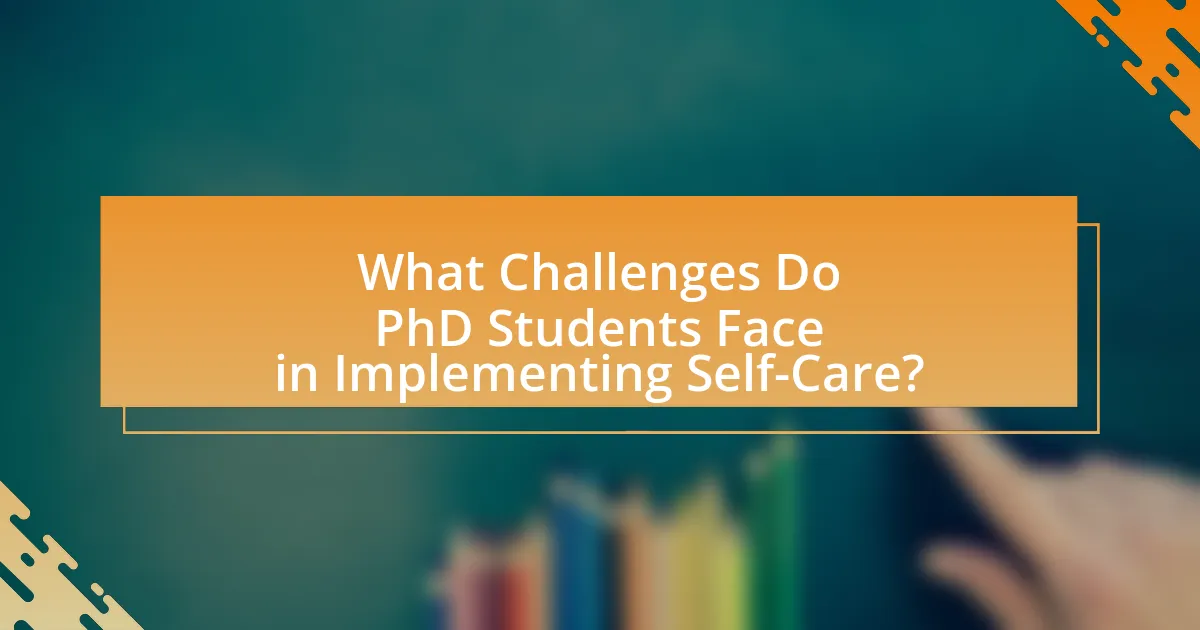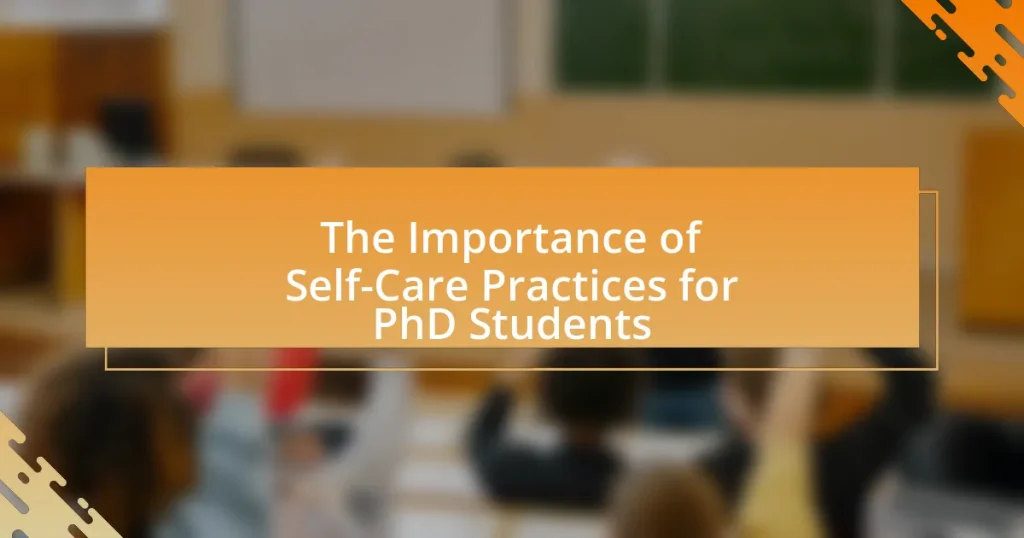The article focuses on the significance of self-care practices for PhD students, highlighting their essential role in enhancing mental health, academic performance, and overall well-being. It outlines various self-care strategies, including physical exercise, mindfulness meditation, balanced nutrition, and adequate sleep, which are crucial for managing the high levels of stress and anxiety commonly experienced in doctoral studies. The article also discusses common stressors faced by PhD students, such as academic pressure and isolation, and emphasizes how effective self-care can mitigate these challenges. Additionally, it provides practical tips for implementing self-care routines and overcoming barriers to ensure a healthier academic experience.

What are Self-Care Practices for PhD Students?
Self-care practices for PhD students include regular physical exercise, mindfulness meditation, maintaining a balanced diet, and establishing a consistent sleep schedule. Engaging in physical exercise has been shown to reduce stress and improve mental health, which is crucial for the demanding nature of PhD studies. Mindfulness meditation can enhance focus and emotional regulation, helping students manage anxiety. A balanced diet supports cognitive function and overall well-being, while adequate sleep is essential for memory consolidation and academic performance. Research indicates that these practices contribute to better academic outcomes and mental health, underscoring their importance for PhD students.
Why is self-care essential for PhD students?
Self-care is essential for PhD students because it directly impacts their mental health, academic performance, and overall well-being. Research indicates that PhD students experience high levels of stress, anxiety, and depression, with studies showing that nearly 40% report experiencing psychological distress. Engaging in self-care practices, such as regular exercise, adequate sleep, and mindfulness, can mitigate these negative effects, enhance resilience, and improve focus. Furthermore, self-care fosters a balanced lifestyle, which is crucial for sustaining motivation and productivity throughout the demanding PhD journey.
What are the common stressors faced by PhD students?
PhD students commonly face stressors such as academic pressure, time management challenges, isolation, and financial concerns. Academic pressure arises from the demands of research, coursework, and the expectation to publish, which can lead to anxiety and burnout. Time management challenges stem from balancing research, teaching responsibilities, and personal life, often resulting in overwhelming workloads. Isolation is frequently experienced due to the solitary nature of research work, which can affect mental health and motivation. Financial concerns are prevalent as many PhD students rely on limited funding or stipends, creating stress related to living expenses and future job prospects. These stressors are well-documented in studies, such as the one conducted by the University of California, which highlights the mental health challenges faced by graduate students, emphasizing the need for effective self-care practices to mitigate these issues.
How does self-care mitigate these stressors?
Self-care mitigates stressors by enhancing emotional resilience and promoting mental well-being among PhD students. Engaging in self-care activities, such as regular exercise, mindfulness practices, and adequate sleep, has been shown to reduce anxiety and improve mood, which directly counteracts the pressures of academic demands. Research indicates that students who prioritize self-care report lower levels of stress and higher overall satisfaction with their academic experience, as evidenced by a study published in the Journal of Educational Psychology, which found that self-care practices significantly correlated with reduced burnout rates among graduate students.
What types of self-care practices can PhD students adopt?
PhD students can adopt various self-care practices, including mindfulness meditation, regular physical exercise, and establishing a balanced work-life schedule. Mindfulness meditation has been shown to reduce stress and improve focus, which is crucial for the demanding nature of doctoral studies. Regular physical exercise, such as jogging or yoga, enhances mental health and boosts energy levels, contributing to overall well-being. Additionally, setting a balanced work-life schedule helps prevent burnout by ensuring that students allocate time for relaxation and social activities, which are essential for maintaining mental health during the rigorous PhD journey.
What are the physical self-care practices beneficial for PhD students?
Physical self-care practices beneficial for PhD students include regular exercise, adequate sleep, and proper nutrition. Engaging in physical activities such as jogging, yoga, or gym workouts enhances mental clarity and reduces stress, which is crucial for the demanding nature of PhD studies. Research indicates that exercise releases endorphins, improving mood and cognitive function (Craft & Perna, 2004, “The Benefits of Exercise for the Clinically Depressed”). Additionally, maintaining a consistent sleep schedule of 7-9 hours per night supports memory consolidation and overall health, as sleep deprivation negatively impacts academic performance (Walker, 2017, “Why We Sleep: Unlocking the Power of Sleep and Dreams”). Lastly, a balanced diet rich in fruits, vegetables, and whole grains provides essential nutrients that support brain function and energy levels, which are vital for sustained focus and productivity during research and writing tasks.
How can mental self-care practices improve a PhD student’s experience?
Mental self-care practices can significantly enhance a PhD student’s experience by reducing stress and improving overall well-being. Engaging in activities such as mindfulness, regular exercise, and adequate sleep has been shown to lower anxiety levels and increase focus, which are critical for academic success. Research published in the Journal of Educational Psychology indicates that students who practice self-care report higher levels of satisfaction and lower levels of burnout. By prioritizing mental health, PhD students can maintain motivation and resilience, ultimately leading to a more productive and fulfilling academic journey.
What role does social self-care play in a PhD student’s life?
Social self-care plays a crucial role in a PhD student’s life by fostering emotional well-being and reducing stress. Engaging in social activities helps students build supportive networks, which are essential for navigating the challenges of doctoral studies. Research indicates that strong social connections can enhance resilience and academic performance, as students who maintain social interactions report lower levels of anxiety and depression. A study published in the Journal of Higher Education found that PhD students with active social lives are more likely to complete their programs on time, highlighting the importance of social self-care in achieving academic success.
How do Self-Care Practices Impact PhD Students’ Well-Being?
Self-care practices significantly enhance the well-being of PhD students by reducing stress and improving mental health. Engaging in activities such as regular exercise, mindfulness, and social interactions has been shown to lower anxiety levels and increase resilience among graduate students. A study published in the Journal of American College Health found that students who practiced self-care reported higher levels of life satisfaction and lower levels of perceived stress. This correlation indicates that self-care not only fosters emotional stability but also contributes to academic success by enabling students to manage their workload more effectively.
What are the psychological benefits of self-care for PhD students?
Self-care provides significant psychological benefits for PhD students, including reduced stress, enhanced emotional well-being, and improved focus. Engaging in self-care activities helps mitigate the high levels of anxiety and depression often experienced in rigorous academic environments. Research indicates that self-care practices, such as mindfulness and physical exercise, can lead to lower cortisol levels, which are associated with stress reduction. A study published in the Journal of American College Health found that students who practiced self-care reported higher levels of life satisfaction and lower levels of perceived stress. Therefore, self-care is essential for maintaining mental health and academic performance among PhD students.
How does self-care influence academic performance?
Self-care significantly enhances academic performance by improving mental health, focus, and overall well-being. Research indicates that students who engage in regular self-care practices, such as exercise, adequate sleep, and mindfulness, report higher levels of academic achievement. For instance, a study published in the Journal of Educational Psychology found that students who prioritized self-care had better concentration and lower stress levels, leading to improved grades. Additionally, self-care fosters resilience, enabling students to cope with academic pressures more effectively, which further contributes to their success in a demanding academic environment.
What is the relationship between self-care and mental health in PhD students?
Self-care significantly enhances mental health in PhD students by reducing stress and preventing burnout. Research indicates that engaging in self-care practices, such as regular exercise, mindfulness, and social support, leads to improved emotional well-being and academic performance. A study published in the Journal of American College Health found that PhD students who prioritized self-care reported lower levels of anxiety and depression, highlighting the direct correlation between self-care activities and mental health outcomes.
How can self-care practices enhance productivity for PhD students?
Self-care practices enhance productivity for PhD students by improving mental health, increasing focus, and reducing burnout. Engaging in regular self-care activities, such as exercise, mindfulness, and adequate sleep, has been shown to lead to better cognitive function and emotional resilience. Research indicates that students who prioritize self-care report higher levels of academic performance and lower levels of stress, which directly correlates with increased productivity. For instance, a study published in the Journal of Educational Psychology found that students who practiced self-care techniques experienced a 20% increase in their ability to concentrate on academic tasks.
What strategies can be implemented to balance self-care and academic responsibilities?
To balance self-care and academic responsibilities, students should implement time management techniques, prioritize tasks, and establish boundaries. Effective time management allows students to allocate specific periods for study and self-care, ensuring that neither is neglected. Prioritizing tasks helps in focusing on the most critical academic responsibilities first, which can reduce stress and create more time for self-care activities. Establishing boundaries, such as setting limits on study hours and ensuring time for relaxation or hobbies, is essential for maintaining mental health. Research indicates that students who engage in regular self-care practices report lower levels of stress and higher academic performance, highlighting the importance of these strategies in achieving a healthy balance.
How does time management relate to effective self-care?
Time management is crucial for effective self-care as it allows individuals to allocate sufficient time for personal well-being activities alongside academic responsibilities. By prioritizing tasks and setting boundaries, PhD students can reduce stress and prevent burnout, which are common in high-pressure academic environments. Research indicates that effective time management strategies, such as the Pomodoro Technique or time blocking, can enhance productivity and create space for self-care practices like exercise, relaxation, and social interactions. This balance ultimately leads to improved mental health and academic performance, demonstrating the direct correlation between managing time effectively and maintaining self-care.

What Challenges Do PhD Students Face in Implementing Self-Care?
PhD students face significant challenges in implementing self-care, primarily due to time constraints, high academic pressure, and a lack of institutional support. Time constraints arise from the demanding nature of research, coursework, and teaching responsibilities, often leaving little room for personal well-being activities. High academic pressure can lead to stress and burnout, making it difficult for students to prioritize self-care practices. Additionally, many institutions do not provide adequate resources or programs to support mental health and wellness, further complicating students’ ability to engage in self-care. Research indicates that these factors contribute to a higher incidence of mental health issues among PhD students, highlighting the critical need for effective self-care strategies within this population.
What barriers prevent PhD students from practicing self-care?
PhD students face several barriers that prevent them from practicing self-care, including time constraints, high academic pressure, and a lack of institutional support. Time constraints arise from the demanding nature of research, coursework, and teaching responsibilities, which often lead to prioritizing academic obligations over personal well-being. High academic pressure, characterized by the need to publish, secure funding, and meet deadlines, can create a culture where self-care is viewed as a luxury rather than a necessity. Additionally, many institutions lack adequate resources or programs that promote mental health and well-being, further discouraging students from engaging in self-care practices. These factors collectively contribute to a challenging environment for PhD students, making it difficult for them to prioritize their health and well-being.
How can time constraints affect self-care routines?
Time constraints can significantly hinder self-care routines by limiting the time available for essential activities that promote mental and physical well-being. When PhD students face tight deadlines or heavy workloads, they often prioritize academic responsibilities over self-care, leading to increased stress and burnout. Research indicates that neglecting self-care can result in decreased productivity and overall health deterioration, as evidenced by a study published in the Journal of Educational Psychology, which found that students who engaged in regular self-care practices reported higher levels of academic performance and lower stress levels. Thus, the impact of time constraints on self-care routines is profound, as it directly affects both the well-being and academic success of individuals.
What misconceptions about self-care might hinder its practice?
Misconceptions about self-care that hinder its practice include the belief that self-care is selfish, that it requires significant time and resources, and that it is only for those in crisis. Many individuals, particularly PhD students, may think prioritizing their well-being detracts from their academic responsibilities, leading to guilt and neglect of self-care activities. Additionally, the perception that effective self-care necessitates extensive time or financial investment can discourage individuals from engaging in simple, yet impactful practices. Research indicates that even brief moments of self-care can enhance productivity and mental health, demonstrating that self-care is accessible and beneficial for everyone, not just those facing severe stress.
How can PhD students overcome these challenges?
PhD students can overcome challenges by implementing effective self-care practices such as regular exercise, mindfulness, and time management. Research indicates that physical activity enhances mental health and cognitive function, which is crucial for managing the stress associated with doctoral studies. Mindfulness techniques, including meditation, have been shown to reduce anxiety and improve focus, allowing students to navigate their academic responsibilities more effectively. Additionally, adopting structured time management strategies can help students balance their research, coursework, and personal life, leading to increased productivity and reduced burnout. These practices collectively contribute to a healthier academic experience, as evidenced by studies highlighting the positive correlation between self-care and academic performance.
What resources are available to support self-care for PhD students?
PhD students can access various resources to support self-care, including counseling services, wellness workshops, peer support groups, and online mental health platforms. Universities often provide counseling services that offer individual therapy and group sessions tailored for graduate students, addressing stress management and mental health. Wellness workshops focus on topics such as mindfulness, time management, and work-life balance, equipping students with practical skills. Peer support groups foster community and shared experiences, allowing students to connect and discuss challenges. Additionally, online platforms like Headspace and Calm offer guided meditation and relaxation techniques, which are beneficial for managing anxiety and promoting mental well-being. These resources collectively contribute to the overall mental health and resilience of PhD students.
How can peer support enhance self-care practices?
Peer support enhances self-care practices by providing emotional encouragement, accountability, and shared experiences among individuals. This support system fosters a sense of belonging and reduces feelings of isolation, which are common among PhD students. Research indicates that peer support groups can lead to improved mental health outcomes, as they allow individuals to share coping strategies and resources, ultimately promoting healthier self-care routines. For instance, a study published in the Journal of College Student Development found that students who engaged in peer support reported higher levels of well-being and lower levels of stress, demonstrating the tangible benefits of such networks in enhancing self-care practices.
What are some practical self-care tips for PhD students?
Practical self-care tips for PhD students include establishing a structured daily routine, prioritizing physical health through regular exercise and balanced nutrition, and ensuring adequate sleep. A structured routine helps manage time effectively, reducing stress and enhancing productivity. Regular exercise has been shown to improve mental health and cognitive function, while a balanced diet supports overall well-being. Additionally, studies indicate that sleep deprivation negatively impacts academic performance, making sufficient rest crucial for success in a PhD program. Engaging in mindfulness practices, such as meditation or yoga, can also alleviate stress and improve focus, further supporting academic endeavors.
How can PhD students create a personalized self-care plan?
PhD students can create a personalized self-care plan by assessing their individual needs, setting specific goals, and incorporating activities that promote mental, emotional, and physical well-being. First, students should evaluate their stressors and identify areas where they need support, such as time management, social connections, or physical health. Next, they should establish clear, achievable goals tailored to their lifestyle, such as dedicating time for exercise, mindfulness practices, or social interactions. Finally, students should regularly review and adjust their self-care plan to ensure it remains effective and relevant to their evolving needs. Research indicates that personalized self-care practices can significantly reduce stress and improve overall well-being among graduate students, highlighting the importance of a tailored approach.
What daily habits can promote better self-care among PhD students?
Daily habits that can promote better self-care among PhD students include regular physical exercise, mindfulness practices, and structured time management. Engaging in physical exercise, such as walking or yoga, has been shown to reduce stress and improve mental health, which is crucial for the demanding nature of PhD studies. Mindfulness practices, like meditation or deep-breathing exercises, can enhance focus and emotional regulation, helping students cope with academic pressures. Additionally, implementing structured time management techniques, such as the Pomodoro Technique, can prevent burnout by ensuring that students take regular breaks and maintain a balanced workload. Research indicates that these habits contribute to improved well-being and academic performance, making them essential for PhD students.



